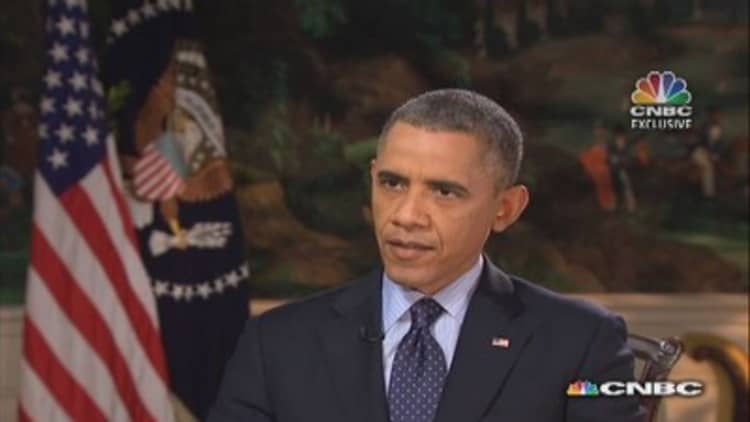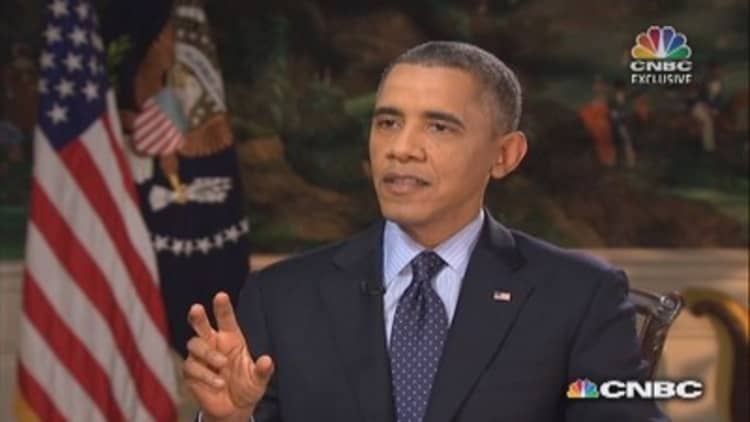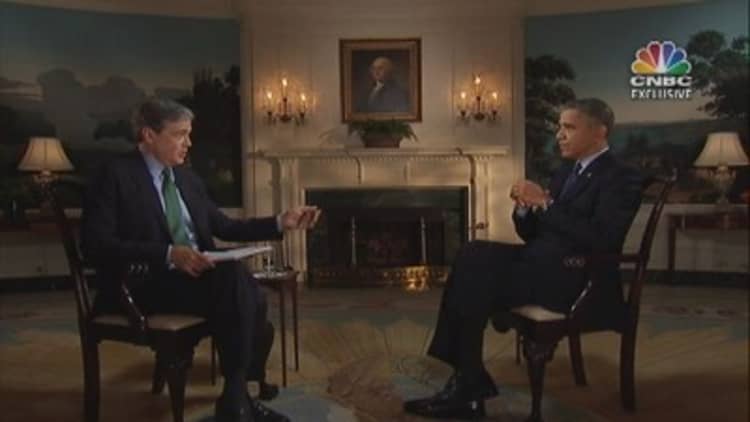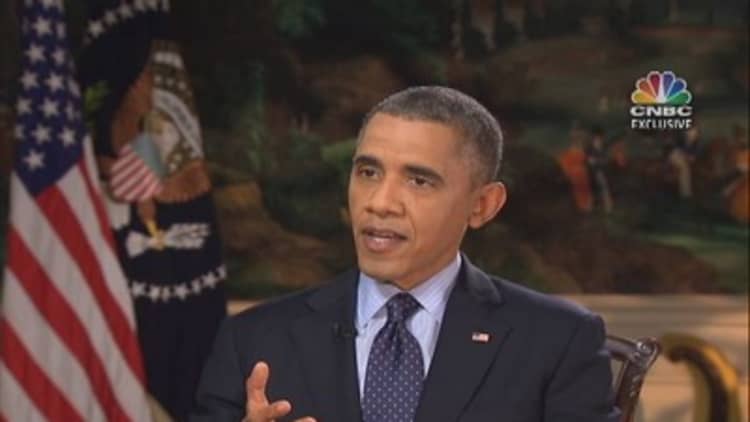
Wall Street needs to be genuinely worried about what is going on in Washington, President Barack Obama told CNBC in a White House interview Wednesday.
While gridlock in D.C. is nothing new, "this time I think Wall Street should be concerned," Obama said.
"When you have a situation in which a faction is willing to default on U.S. obligations, then we are in trouble," Obama said.
U.S. stock-index futures pointed to a lower open on Wall Street Thursday. Click here to get the latest futures action.
(Read more: Wall Street wonders: Does Obama want a selloff?)
Late Wednesday, Obama met with Republican and Democratic leaders in Congress, including House Speaker John Boehner, House Minority Leader Nancy Pelosi, Senate Majority Leader Harry Reid and Senate Minority Leader Mitch McConnell.
McConnell told CNBC's "The Kudlow Report" that Washington is still far from resolving its differences over the fight to reopen the government.
(Read more: Sen. McConnell: White House meeting 'unproductive')
Boehner said Obama reiterated in the meeting with congressional leaders that he would not negotiate. The speaker said he hoped Obama and Democrats in the Senate would have a serious discussion about resolving their differences very soon.
Pelosi said Obama will not use the 14th Amendment to the Constitution to raise the debt ceiling on his own, without congressional approval. A section of the amendment says the public debt of the U.S. "shall not be questioned."
In the CNBC interview, Obama expressed his exasperation with the tea party faction of the Republican party, saying that their reflexive hostility to "civil" negotiation threatens not only the functioning of government, but the wider health of the economy.
"I am exasperated with the idea that unless I say that 20 million people, 'you can't have health insurance, they will not reopen the government.' That is irresponsible," he said.
Exasperated

"If we get into the habit where one party is allowed to extort, ... then any president who comes after me we be unable to govern effectively," Obama said.
(Read more: Obama lights up social media with Wall Street warning)
"One thing I know that the American people are tired of, and I have to assume businesses are tired of, is this constant governing from crisis to crisis," Obama said.
Complicating the problem is that there are potential negotiating partners in the GOP, but that the leadership is a prisoner to the tea party minority.
While saying that he doesn't make decisions based on the performance of the stock market, the president nonetheless said that the current impasse could have a huge impact on business.

(Read more: Transcript of complete Obama interview)
"It is important for [Wall Street] to recognize that this is going to have a profound impact on our economy and their bottom lines, their employees and their shareholders," Obama said.
The shutdown has closed landmarks such as the Grand Canyon and stopped the released of federal economic releases.
Obama would not comment on who he's likely to nominate to succeed Fed Chairman Ben Bernanke.
"Ben's still there's; he's doing a fine job," he said. The ultimate nominee would have to keep an eye on inflation and employment, in keeping with the Fed's dual mandate, the president said.

On Obamacare, the president's most significant legislative accomplishment, Obama said that despite certain polls showing it was unpopular with specific segments of the population—namely white people—the law would ultimately be accepted by the population at large.
Tenets of the bill are popular among "all races" the president said. "The majority of the people who will be helped by the ACA will be white," he said.
—By CNBC's John Harwood. Follow him on Twitter @JohnJHarwood. CNBC.com's Matt Hunter and Reuters contributed to this report.
Correction: This version corrects McConnell's title to Senate Minority Leader.


